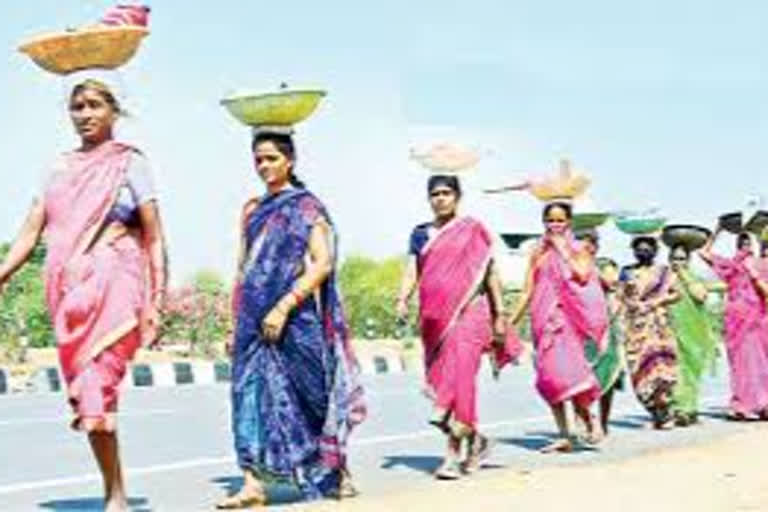Hyderabad (Telangana): After Rs 6,000 crore worth of proposals have come from states under Compensatory Afforestation Fund Management and Planning Authority (CAMPA funds) there are chances that tribal people will get employment in forest management, wildlife protection/ management and other forest-related activities.
As per an estimate of the Ministry of Tribal Affairs, 1.5-2 million people from tribal areas work in different parts of the country. But at the present moment, tribals are jobless and are running out of money and as a result, they are now arriving at the quarantine camps in their home states.
Centre's 'TRIBAL STARTUPS'
According to sources, the ministry has framed a livelihood programme for these labourers, called Livelihood with Safety. Under this programme, the Centre has planned ‘tribal startups’, which will encourage tribals to form working groups or self-help groups. They may be organised according to skills and given suggestions for undertaking work such as value-addition, making products with locally-available raw materials, or production of artefacts that are unique to that region.
The ministry has written to the states, especially those with high tribal population, to frame proposals for grants from the Centre. For this, the ministry has entrusted Tribal Cooperative Marketing Development Federation of India (TRIFED) to frame specific programmes for the states.
The Union government exempted the collection of MFP from the lockdown on April 17, 2020, and revised the minimum support price (MSP) for 49 MFPs on May 1, 2020.
On May 12, 2020, while interacting with representatives from 20 states and union territories, tribal affairs minister Arjun Munda said his ministry is supporting Van Dhan Kendras and the infrastructure facilities required for value addition and marketing of tribal produce. Van Dhan Kendras buy forest produce collected by tribespeople.
READ:Karnataka artist makes clay model of Kerala pregnant wild tusker, pays tribute
What are the losses incurred?
The nationwide lockdown due to COVID-19 has impacted the collection and sale of minor forest produce (MFP)--non-timber forest products including bamboo, cane, fodder, leaves, gums and waxes--affecting the livelihood of millions of tribespeople and forest-dwellers across India, as per estimates by a group of independent researchers.
An estimated 100 million forest dwellers depend on MFP for food, shelter, medicines and cash income. MFP collection constitutes up to 40% of their annual income. Annually, they collect MFP in the tune of Rs 2 lakh crore, according to data from the Tribal Co-operative Marketing Development Federation (TRIFED), a government entity. Thus, the value of collection between April and June--60% of the total--would stand at Rs 1.2 lakh crore (or Rs 1.2 trillion).
Further, the trading and value chain of Non-timber forest products (NTFPs) has been completely disrupted under the lockdown as traders are not willing to buy NTFPs in the current situation. Both the central and state govts need to devise strategies to engage with the traders to ensure purchase of NTFPs. Application of GST on tendu leaves has further affected the income of communities depending on tendu leave collection.
Government data claim 17 states had procured MFP worth Rs 40 crore by May 11, 2020. Further, the Union government has announced it will approve plans worth Rs 6,000 crore under CAMPA to create forestry jobs in tribal areas.
What are the problems in tribal belts?
Reportedly, the ICDS (Integrated Child Development Services) was adversely affected during the first stages of lockdown due to lack of preparation. Tribals had to survive on stock available at home, with no new stock or cooked food coming in.
Malnutrition might increase in the tribals belts as the nutritious food from Angandwadi fails to reach the inner belts due to lack of supply.
Lack of workdays under MGNREGA as more workers arrive from other states to their native places.
Poor access of tribal and forest dwellers to Public Distribution System (PDS) is reported from across the states. Provisions under the Public Distribution System (PDS) are not adequately provided or are provided only to cardholders. Tribal migrants have particularly faced problems to access PDS.
The COVID-19 pandemic and lockdown have created particular problems for forest areas, the collective pointed out. Lack of information on COVID-19 is particularly dangerous for tribals and forest dwellers as they live in areas with poor public healthcare. Tribal migrant workers stuck in cities are facing acute hunger and often police atrocities, causing mental and psychological distress.
READ: Construction firms wooing migrant workers with air tickets, sops



